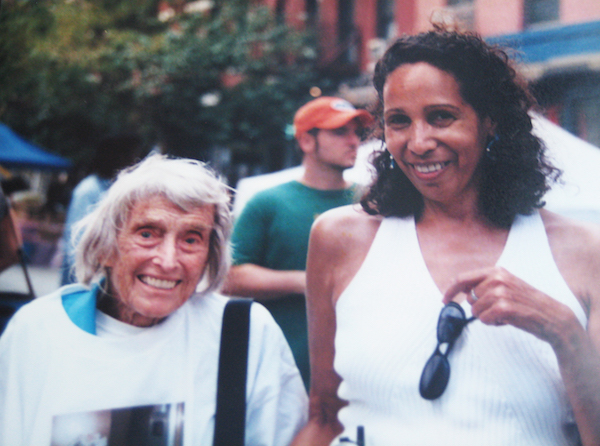
BY DUSICA SUE MALESEVIC | Some memories are indelible. For Norma Aviles, a lifelong Chelsea resident, there is no way to forget what happened after the third — and biggest — fire hit her W. 17 St. building on a cold December morning in 1986.
“Here we are, standing in the street [at] 3:30, four o’clock in the morning and we see Jane Wood coming down the block,” Aviles recalled. “I see her coming down the block and I’m like, “What are you doing here?’ ”
Wood, who used to live on W. 19th St., was the founder of the Chelsea Coalition on Housing and a force to be reckoned with. She had a message for the tenants: they could not leave the building.
Aviles, six months pregnant, told Wood, “I gotta leave the building.”
No, insisted Wood, they were going to come up with a plan to stay in order to thwart the landlord, who could use the fire to get them out of their apartments, Aviles recalled.
“And the firemen are saying, ‘Lady, you’re crazy — they can’t go back in there,’ ” she told Chelsea Now at the W. 16th St. & Eighth Ave. Starbucks — a stone’s throw away from the building in question, and the street named “Jane Wood’s Way.”
For four years already, Aviles had been fighting the landlord who owned the building at 457 W. 17th (btw. Ninth & 10th Aves.).
Her parents, Jose and Norma Aviles, moved to Chelsea in the early ’60s to W. 22nd St., and were superintendents. Aviles was born on W. 22nd St. Her parents moved her, and her sisters, to 457 when she was around the age of seven.
The apartment the Aviles family resided in was rent controlled. After her mom and sisters moved out, she decided to stay in the apartment because it had low rent.
When a new landlord took over after the former one died, he wasted no time, she said, sending Aviles a letter stating that she had no right to the apartment and had 30 days to leave.
This is how Aviles’ housing activism started.
Sure, growing up she had seen her mom take part in the Chelsea Coalition on Housing and hold meetings in their apartment — but being young, Aviles was not interested until it became clear that she might lose her place.
Her mom suggested she go to a Coalition meeting, which was held in a nearby building every Thursday night.

“So I went there and I meet my heroine,” she explained, referring to Wood. She then pulled out a photo of her and Wood at a neighborhood block party to show to this reporter.
“With the Coalition, what it teaches is: you learn how to fight and then you help others,” she added. “If anybody needed help, we all went as a group and we supported them.”
At the meeting, she realized that several other residents were experiencing similar problems with the landlord — being forced out.
“Once I got involved with Jane, it just was an eye-opener for me — what was going on around me,” she explained.
From the Coalition, Aviles learned she needed to gather all the information that she could. So she went down to an office by Chambers St. and went through its microfilm, finally finding something that had her father’s name on it. She then wrote her landlord a letter that proved she had the right to stay in the apartment, she said.
This got her landlord off her back for the time being.
“They couldn’t get at me that way,” she said.
But there were other problems with the building — Aviles said that she had no heat or hot water. If there were leaks or things that needed to be repaired, there was no super to take care of it.
“We’re practically on our own and, of course, here comes the winter — we have no heat,” she explained.
Aviles started organizing the tenants and having meetings in her apartment, just like her mom.
Through the years, the building changed hands, with “each landlord worse than the other,” she said.
In the winter of 1986, the third fire — which started in the basement due to a faulty old boiler — was the tipping point. Some of the tenants decided to stay even after the fire, so that they wouldn’t lose their apartments.
“We had gas, so we would boil water on top of the stove to keep the apartment warm,” she recalled. “We don’t want to lose our apartments so we’re going to do everything we can.”
The tenants filed an HP action against the landlord in Housing Court, asking that he make the necessary repairs, she said.
“Here I am, pregnant, and Jane is pushing me to the front when we go to court,” she said with a laugh.
The judge ruled for the tenants and the city ended up installing a boiler, she said.
“That’s how we take the building over — we took it back,” said Aviles, who was working at an advertising agency during that period.
Aviles continued her involvement with the coalition and explained how Wood organized.
“She was an incredible organizer. She gave us all positions. If she found that you were good at one thing, she used you for that. So she knew that I was artsy and that I love my music,” said Aviles, who attended BMCC and studied liberal arts.
When tenants won a fight, the Coalition would throw a party on 17th St. (btw. Eighth & Ninth Aves.). The street would be blocked off, a band would jam and there would be lots of food, which Aviles would organize.
“That was just a way to get your mind away from the hell that you’re living through,” she said. “That was the one day, we got together and it was fun and there was music and you were dancing.”
Aviles said that she misses those days when Chelsea was a close-knit community.
“You look at it now and you say, ‘Really, that was happening?’ ” said Aviles, who has lived on W. 17th St. for almost her whole life. “It was so incredible. I walk down these streets today and I’m like, ‘They’re so different.’ ”
She added, “Even though it’s beautiful now, I just miss the community that we had. We had little stores, we had bodegas, we had pastry shops, we had, you know, the mom and pop stuff.”
Aviles eventually moved out of 457 W. 17th St., which is now a luxury apartment building. According to real estate site Zillow.com, one apartment is selling for around $1.5 million and its monthly rent is $5,300.
She moved, but stayed on W. 17th St., only now between Eighth and Ninth Aves.
Jane Wood passed away in 2004, and two years later Aviles got a job with Housing Court Answers, which used to be called the City-Wide Task Force on Housing Court. She first worked in Queens and then became Brooklyn coordinator.
“It reminds me of when we were fighting [in Chelsea],” she said of Brooklyn, where she has worked for nine years. “I see the same faces. I so relate to them. It’s like my people all over again.”
For over 30 years, the nonprofit Housing Court Answers (cwtfhc.org) has helped tenants in housing court matters. They have a hotline and tables at the courts to provide tenants with information in multiple languages.
Aviles continues to fight, using what Wood and the coalition taught her.
“I can’t walk down the street without having to give somebody some advice,” she said.

































